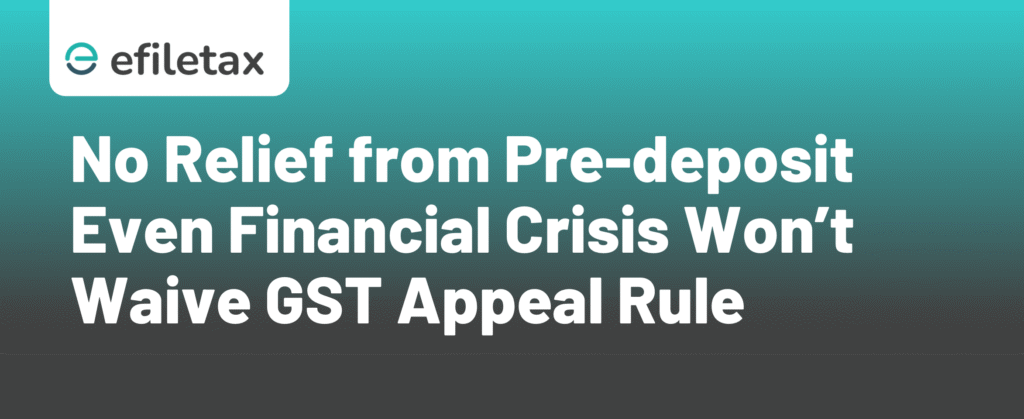
Mandatory Pre-deposit for Tax Appeals What Taxpayers Must Know
If you’re planning to file a tax appeal, mandatory pre-deposit is a rule you simply can’t avoid—even during a financial crisis. Whether you’re a small business reeling under losses or a taxpayer with heavy liabilities, the law requires you to deposit a specified percentage of the disputed tax before your appeal is admitted.
Let’s break this down clearly, with real legal references and practical tips.
What is Mandatory Pre-deposit in Tax Appeals?
A mandatory pre-deposit is the upfront payment a taxpayer must make before filing an appeal under tax laws like:
- The Central Goods and Services Tax (CGST) Act, 2017
- The Income-tax Act, 1961 (under certain circumstances via the DRP or appellate procedures)
- Similar provisions exist in customs and excise laws
This rule was introduced to discourage frivolous appeals and ensure only genuine disputes reach higher authorities.
Pre-deposit Under GST Law
Under Section 107(6) of the CGST Act, 2017:
- To file a first appeal before the Appellate Authority:
- You must pay 100% of the admitted tax, interest, and penalty, and
- 10% of the disputed tax (max ₹25 crore)
- To file a second appeal before the Appellate Tribunal (GSTAT):
- Additional 20% of the disputed amount (making it 30% total) must be paid
✅ No exceptions are allowed—even in cases of financial hardship.
Reference: CBIC GST Law Portal – Section 107
Income Tax Appeals and Pre-deposit
While the Income Tax Act doesn’t mandate a pre-deposit like GST, assessment orders involving stay of demand or DRP directions may include:
- Payment of part of the disputed demand as per CBDT Circular No. 1914
- Standard stay requires 20% of the disputed tax to be paid upfront
Case Law Insight:
In Rohit Pulp & Paper Mills Ltd. v. CCE [(1990) 77 STC 213 (SC)], the Supreme Court held that financial hardship is not a ground for waiving pre-deposit unless the law expressly allows it.
Why Pre-deposit Cannot Be Waived
Many taxpayers argue that their cash flow crisis or financial disaster (like insolvency or COVID-19 losses) should exempt them from this requirement.
However, Indian courts have consistently held:
- Legal obligation overrides financial condition
- Hardship or liability cannot be grounds to bypass statutory mandate
- The Appellate Authority has no power to waive the pre-deposit, unless the statute specifically provides such relief
🧾 Reference Case:
Jay Chemicals Industries v. Union of India [(2022) 91 GST 453 (Guj.)] – Pre-deposit rule upheld even during economic downturn.
What Happens If You Don’t Pay?
- Your appeal will be rejected at the admission stage
- You’ll lose the chance to present your case on merits
- No stay will be granted on the recovery proceedings
Expert Tip: Manage Pre-deposit Strategically
🔍 Efiletax View:
Plan your tax appeal budget in advance. If you’re under financial stress:
- Pay only the disputed portion, not the admitted amount
- Explore reliefs under Insolvency Code or settlement schemes, if applicable
- File for rectification or revision under alternate provisions to delay demand
🛡️ Don’t fight alone. Work with a tax consultant to explore interim relief or payment in instalments, though courts rarely allow this.
Summary
Mandatory pre-deposit is a legal requirement for filing tax appeals under GST and Income Tax laws. Courts have ruled that financial hardship cannot override this statutory condition. Failure to pay leads to automatic dismissal of the appeal.
FAQ: Mandatory Pre-deposit for Tax Appeals
Q1. Can I get an exemption from the pre-deposit due to financial hardship?
No. Courts have held that there’s no waiver allowed unless the statute itself provides for it.
Q2. What if I file the appeal without the pre-deposit?
Your appeal will not be admitted. Recovery proceedings can begin.
Q3. Is there a cap on GST pre-deposit?
Yes. The 10% amount under first appeal is capped at ₹25 crore.
Final Thoughts
The mandatory pre-deposit rule is strict and non-negotiable. Even if you’re struggling financially, the law demands upfront payment before your appeal is entertained.